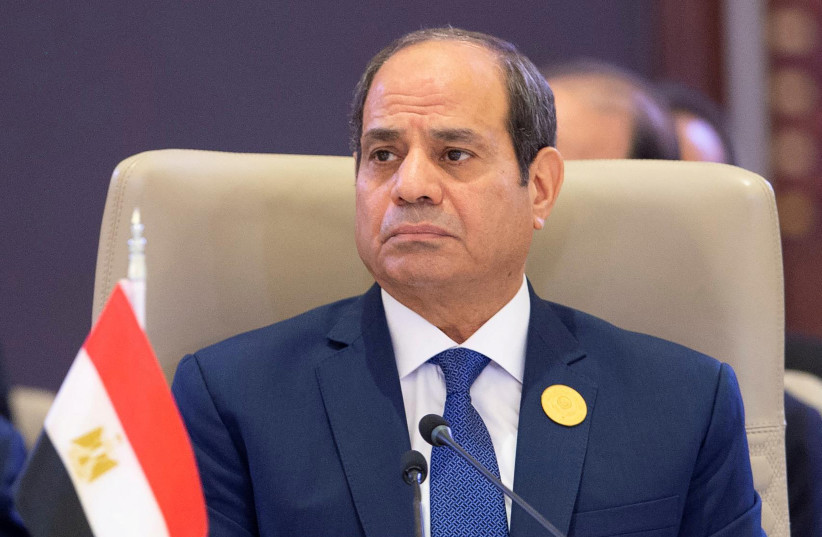‘Palestinian exodus’ threatens Israel-Egypt stability – opinion
The Gaza war presents Israel-Egypt relations with serious challenges.
The first of these is Egypt’s concern about the influx of Palestinians from Gaza to Sinai through the Egyptian border.
The second is the question of humanitarian aid passing from Egypt to Gaza through the Rafah crossing (it passed from Israel to Gaza via the Kerem Shalom crossing). The third issue, which has arisen in recent days, concerns the control of the Philadelphi Route, a 14 km.-long road that forms the border between Egypt and Gaza.
Prospects of thousands of Palestinians pouring into Sinai are of deep concern to Egypt’s leadership, which keeps voicing vehement opposition to the idea. Even the Chinese foreign minister, who visited Egypt on January 14, was mobilized to express his condemnation of such a move.
Irresponsible and unnecessary statements by Israeli officials have fueled Egyptian suspicions about the existence of a secret Israeli plan to expel Palestinians from Gaza.

The main issues that cause Egypt concern during the Israel-Hamas war
Three issues underlie Egypt’s concerns in this context: fear of Hamas terrorists entering their territory under civilian guise; ideas for annexing Egyptian territory to Gaza following the exodus of its Palestinian residents; and Arab accusations that by doing so, Egypt is actually helping Israel obliterate the Palestinian problem.
Regarding the second issue: humanitarian aid to Gaza. The Egyptian media frequently reports on the number of trucks and the quantity of equipment transported daily into the Gaza Strip, in order to demonstrate Egypt’s sincere dedication to the Palestinian cause. Meanwhile, it reacts harshly to implied Israeli criticism of Egypt for hampering and delaying the passage of humanitarian aid into Gaza.
Finally, the issue of the Philadelphi Route control surfaced in recent days, after Netanyahu declared that the road “must be in our hands.” The route was evacuated by Israel as part of its disengagement from Gaza in 2005. It was a controversial decision, made to a large extent by defense minister Shaul Mofaz without consulting the military.
Israel’s decision to vacate the road took Egypt by surprise, eventually leading to an amendment of the peace treaty that allowed Egypt to deploy 750 border police personnel (rather than the 650 policemen permitted under the 1979 peace agreement) to guard the border along the Philadelphi route.
After Hamas took over Gaza in the summer of 2007, smuggling increased through the tunnels built under the route. Israel complained to the Egyptians and provided concrete information about the smuggling, but the Egyptians did not rush to act.
Israel therefore appealed to the United States to exert pressure, but the problem was not resolved satisfactorily. In one Wikileaks document, Shin Bet chief Yuval Diskin is quoted as prophesying, in 2008, that sooner or later Israel would have to invade Gaza to dismantle Hamas’s terrorist capabilities, take over the southern part of the Gaza Strip, and put an end to the smuggling.
In fact, it took three Israeli military operations against Hamas: Cast Lead (2009); Pillar of Defense (2012); and Protective Edge (2014) for President Abdel Fattah el-Sisi to seriously address the tunnel threat. However, the Egyptian measures failed to seal off the passages hermetically, as evidenced by the quantity of Hamas weapons and ammunition discovered so far by Israeli forces during the war.
Israel’s discovery of the extent of Hamas tunnels along hundreds of kilometers under Gaza troubles Egypt – and would likely spur its cooperation with Israel in preventing smuggling.
Various sources report that behind-the-scenes talks on the matter are underway between Israel, Egypt, and the US.
The main problem, however, lies in the fact that Egypt’s government cannot afford to be portrayed as having withdrawn from Philadelphi or conceded to Israel, especially after Israel ceded control of the route in a 2005 agreement. One Egyptian parliamentarian has already slammed Netanyahu’s remarks as a “blatant attack on the peace agreement.”
Both Israel and Egypt have a strategic interest in peace. The two states, as the Wikileaks document stated back in 2009, “have a common enemy: Hamas.” Despite hostile public opinion towards Israel and occasional inflammatory political statements, Sisi has led a moderate and sober policy vis-à-vis Israel, even refraining from recalling his ambassador – unlike Egypt’s reaction during the 1982 Lebanon War and the 2000-2004 Intifada.
Israel must therefore be attentive to Egyptian sensitivities, avoid inflammatory statements, and resolve the issue of Philadelphi Route control in agreement, behind closed doors, with Egypt and the United States.
The writer is a board member of Mitvim Institute for Regional Foreign Policies, and teaches at the Department of Islamic and Middle Eastern Studies of the Hebrew University of Jerusalem.





Comments are closed.